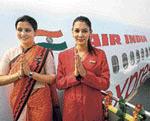
New Delhi, July 15: The scheduling of international flights, including those to new destinations, which Air India will fly this winter has been affected as the fate of sacked 101 pilots is still hanging in balance.
The availability of the exact number of pilots is a crucial factor in deciding how many flights an airline would be able to operate.
"We are facing a peculiar problem right now. We know the number of aircraft we will have, but we still can't plan our winter schedule. This is because the management is yet to take a decision on taking back the sacked pilots," an Air India official told PTI.
A total of 101 pilots, owing allegiance to the Indian Pilots Guild, were sacked during the 58-day long strike that was recently staged over career progression and other issues.
The matter is also pending before the Delhi High Court.
"We don't know how many pilots would be available to us for winter schedule. Even if they are taken back, it will take about two to three months for them to clear all the necessary formalities and resume their active duty," the officer said.
"This suspense is also creating hurdles in announcing new international flights, like those to Melbourne, which we had planned very early. If the situation persists, then we would not be able to reap benefits," he said.
Maintaining that the pilots have to be informed at least a month before their scheduled date of operation for an international flight, he said the winter schedule, beginning in October, has to be cleared by aviation regulator Director General of Civil Aviation (DGCA).






Comments
Add new comment